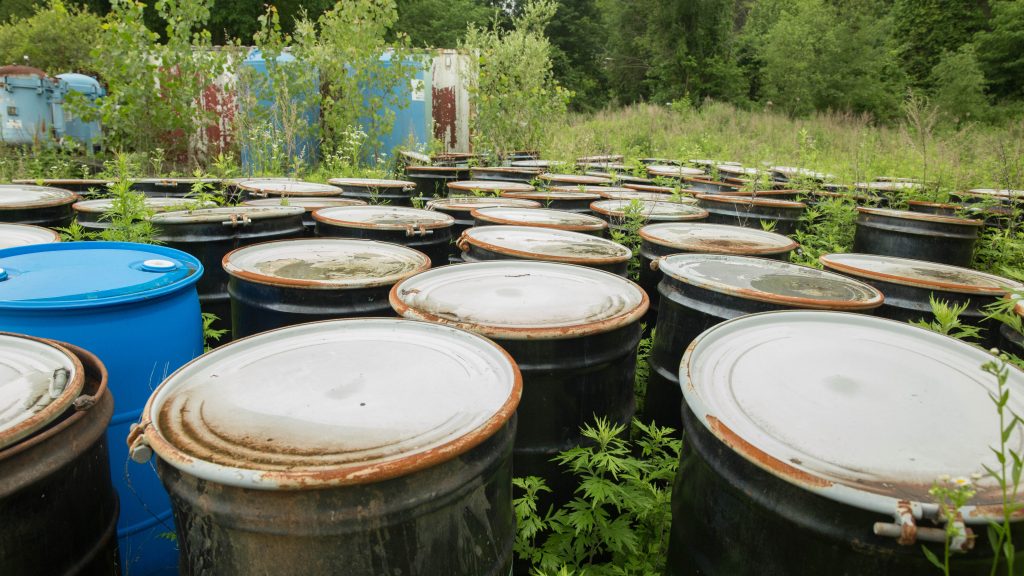Experts react to Trump administration’s proposed Superfund cuts

Barrels filled with non-hazardous waste line the area near a Superfund site in Ringwood, New Jersey. (Photo by Karl Schneider/News21)
PHOENIX – Under President Donald Trump’s proposed budget, the Environmental Protection Agency would face a 31 percent cut – or about $2.6 billion. The cuts would include a 30 percent decrease in funding to the Superfund program.
Though the president’s budget serves largely as a suggestion for Congress, it does reflect the administration’s priorities.
President Jimmy Carter signed the Superfund bill into law in 1980. The program was established to clean up some of the nation’s most contaminated areas. It emerged, in part, as a response to harmful waste management practices in Love Canal – a small neighborhood within Niagara Falls, New York, according to lawmakers familiar with the law’s passage. Families developed health issues in the late 1970s – a couple decades after the Hooker Chemical Co. dumped massive amounts of toxic waste into the ground.
Former New Jersey congressman Jim Florio authored the bill to give the EPA authority to fund cleanup efforts and hold polluters accountable for the damage they had caused.
“What the law essentially did was provide the authority and the funding for cleaning up existing toxic waste dump sites that were particularly dangerous,” said Florio, who also served as the state’s governor from 1990 to 1994.
Funding for the program has steadily declined over time, and the dwindling resources have contributed to a slow pace of cleanup. A 2015 report from the U.S. Government Accountability Office found an increase in the number of Superfund sites as funding from congressional appropriations declined from $2 billion to $1.1 billion from 1999 to 2013.
News21 spoke to former lawmakers and officials familiar with the Superfund program. They suggested Trump’s proposed cuts could further damage the EPA, including the Superfund program.

James Florio (Photo courtesy of Florio Perrucci Steinhardt & Fader LLC)
James Florio authored the Comprehensive Environmental Response, Compensation, and Liability Act, commonly known as the Superfund bill. He later served as the 49th governor of New Jersey from 1990 to 1994. He also got to know Trump personally during his time as a board member for Trump Entertainment Resorts.
“I know Donald Trump very well. He is not an environmentally-sensitive person for this nation. I’m not overly optimistic that we’re going to have even effective, much less vigorous, enforcement of the law. It’s going to be up to citizens to become more engaged and bring to the public’s attention these problems so that public opinion can weigh in and try to force the EPA to do the minimum things that they’re required to do.”

Marianne Horinko (Photo courtesy of The Horinko Group)
Marianne Horinko served as the acting administrator for the EPA under President George W. Bush’s administration for about four months in 2003. Today, she serves as the president for the Horinko Group, an environmental consulting firm based in Washington, D.C.
“Every federal agency is having to tighten its belt right now. But I think EPA’s core mission and its values are too important to the American people to have drastic cuts. I think, eventually, the EPA, and Superfund in particular, will continue to assume an important role.”

Mathy Stanislaus (Photo courtesy of Mathy Stanislaus)
Mathy Stanislaus oversaw the Superfund program from 2009 to 2017 under President Barack Obama. He served as the assistant administrator of the EPA’s Office of Land and Emergency Management.
“It’s hard at this moment to see how the Superfund program will work during this administration. There seems to be more emphasis on reducing the burden on responsible parties, and I don’t see any emphasis on the communities that are living next to these sites.”

Christine Todd Whitman (Photo courtesy of Christine Todd Whitman)
Christine Todd Whitman was the first EPA administrator under President George W. Bush’s administration. She left the agency after two and a half years. Before leading the EPA, she served as the 50th governor of New Jersey from 1994 to 2001. She is currently the president of the Whitman Strategy Group, a consulting firm specializing in energy and environmental issues.
“With the budget cuts that were proposed, there’s no way the agency can do what it needs to do to support the states. It’s fine to say, ‘Well, the states will do it.’ States don’t have any money. The water infrastructure and the water issue is so big now. We’ve neglected it now for so long. The ratepayer can’t handle it all, the utility can’t pay for it all, the states can’t, and the federal government can’t, alone. They all have to be in this together.”